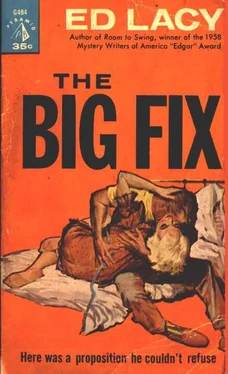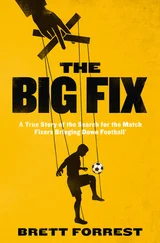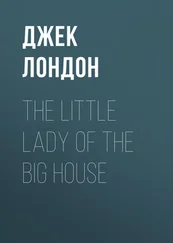Ed Lacy - The Big Fix
Здесь есть возможность читать онлайн «Ed Lacy - The Big Fix» весь текст электронной книги совершенно бесплатно (целиком полную версию без сокращений). В некоторых случаях можно слушать аудио, скачать через торрент в формате fb2 и присутствует краткое содержание. Жанр: Старинная литература, на русском языке. Описание произведения, (предисловие) а так же отзывы посетителей доступны на портале библиотеки ЛибКат.
- Название:The Big Fix
- Автор:
- Жанр:
- Год:неизвестен
- ISBN:нет данных
- Рейтинг книги:5 / 5. Голосов: 1
-
Избранное:Добавить в избранное
- Отзывы:
-
Ваша оценка:
- 100
- 1
- 2
- 3
- 4
- 5
The Big Fix: краткое содержание, описание и аннотация
Предлагаем к чтению аннотацию, описание, краткое содержание или предисловие (зависит от того, что написал сам автор книги «The Big Fix»). Если вы не нашли необходимую информацию о книге — напишите в комментариях, мы постараемся отыскать её.
The Big Fix — читать онлайн бесплатно полную книгу (весь текст) целиком
Ниже представлен текст книги, разбитый по страницам. Система сохранения места последней прочитанной страницы, позволяет с удобством читать онлайн бесплатно книгу «The Big Fix», без необходимости каждый раз заново искать на чём Вы остановились. Поставьте закладку, и сможете в любой момент перейти на страницу, на которой закончили чтение.
Интервал:
Закладка:
“I wouldn't want it no other way.”
The woman in the kitchen called out she was ready to put food on the table. Arno asked Tommy, “Will you go down to the barn and get Jake?”
“Sure.”
Arno winked, put a fat finger on his lips. As Tommy left the room, Arno turned up the TV to catch the end of the cowboy show, took a fast swig from the brandy flask in his pocket. He thought, I could sell the simple bastard the popcorn concession on the moon. Always amazes me, the sillier the line, the harder some mark falls. But a punchy fighter—hardly a workout for me.
DETECTIVE STEINER
Walt Steiner finished his tour of duty at four o'clock and was home watching an old movie on TV by a quarter to five. “Home” was an old-fashioned railroad flat of six rooms, three flights up, in a building which would have been condemned as an ancient tenement—if the area hadn't become a hangout for artists and writers, and young men with immature beards. The landlords found a mild boom on their hands and were quick to welcome the cafe espresso shops, happy the slum was now a second “Greenwich Village.”
Ruth had insisted upon taking the apartment. It didn't make a bit of sense to Walt. Between them they had an income of over ten thousand a year, why live in a roach-infested dump, not to mention the long hours he had put in painting and fixing up the place? Still, it was roomy. Ruth had her “den,” furnished with ugly white iron garden furniture, which pleased her for some unknown reason. (Actually it was most uncomfortable, but the wrought iron furniture was a good conversation “thing.” Friends would ask, “How can you possibly write on that table or sit in the hard chair?” Ruth would reply, the proper note of self-sacrifice in her voice, “Writing is an uncomfortable taskmaster.”) The walls of the apartment had conventional bull fight posters, several abstract oils, and framed photostats of checks from the New Yorker and Seventeen for the two stories Ruth had been paid for—in contrast to her yams in the little literary magazines where the “pay” was a few copies of the magazine.
The bedroom and living room were done in severe ebony modern and after a year or so, Walt almost liked the furniture. He also had his “den,” furnished with a battered bookcase and cracked leather couch which Ruth claimed his folks must have brought from Germany when they came over in 1908. On top of the bookcase were the cups and medals Walt had won as an amateur boxer. On the walls were pictures of Walt as a member of the Olympic boxing squad, of Captain Walt Steiner, coach of the 18th Air Force boxing team in Italy. Someplace around the room was a huge dusty scrapbook, the newspaper clippings already crumpling and yellow with age, full of pictures and stories about Walt when he was the Golden Gloves one hundred seventy-six-pound champion.
Although Walt still wore his white Olympic robe with the faded USA on its back—as a shower robe—he rarely opened his scrapbook, or looked at the pictures on the wall. Now and then, while watching TV fights, he would wonder if he'd been smart in turning down the money offers to turn pro—one manager had dangled a $3000 bonus. When reading of the large purses the champions made, Walt sometimes daydreamed of himself as the light heavyweight champ, perhaps fighting Archie Moore. And whenever he read about the money difficulties of Joe Louis and other greats, he was glad he had chosen to be a cop.
Walt did everything with a kind of Teutonic calm efficiency. He was steady but never spectacular. He had a mild sense of humor and an even milder imagination. In the ring he had fought a plodding dull fight, following the rules to the letter. You led with your left and crossed your right. Walt had been defeated in the finals of the National A.A.U. by a skinny Negro who did everything wrong. He clowned, dancing about the ring with his hands down, often led with his right, and told Walt jokes all during the bout. At the end of three puzzling rounds the colored fighter was puffing, obviously out of condition, while muscular Walt could have gone ten rounds, although badly outpointed.
Even now, when he was thirty-three years old and hadn't boxed in nine years, Walt was only seven pounds over his fighting weight, did stomach exercises every morning. He rarely ate sweets, didn't smoke, and drank only beer, except when Ruth gave a party and he'd take a few drinks to be sociable.
Watching the cowboy riding like crazy across the TV screen, Walt opened his shirt collar, rubbed his bull neck. He kept nervously glancing at his wrist watch. At five-twenty he began staring at the pink telephone. Ruth should be home about now, but he knew she wouldn't. She'd call and tell him about having to work late. Walt grinned bitterly. It was like the old gag in reserve, the cartoon of the boss with his secretary on his lap, phoning his wife and saying he was stuck in conference. Who was sitting in Ruth's lap this minute?
The trouble was, their whole life seemed to be in reverse these days. The other married men on the detective squad went home to have supper with their wives, talk about the funny or unusual things which had happened during the day, horse around with the kids. Walt came home to nothing. But most of the wives he'd met weren't as clever as Ruth, nor as pretty. They certainly couldn't edit a cosmetic trade magazine, write the moving little sketches Ruth was always starting—and never finishing. Some day, Walt was certain, if Ruth would only get with it, she would be a famous writer, at least a...
The doorbell rang. Walt jumped to his feet, relief in his big face. Ruth had stopped to shop, must have her hands full of packages, couldn't use her key. Walt opened the door to see a tall stooped man standing there. From the casual, expensive clothes, Walt thought he must be another of Ruth's “artistic” friends. The man asked, “Detective Walter Steiner?”
The deep, clear voice, vaguely jolted Walt's memory. The tall man's eyes raced to Walt's hip holster. Walt said, “That's me.”
“I hope you'll forgive my barging in like this. I'm Alvin Hammer, the television announcer. I missed you by minutes at the precinct house, couldn't find your number in the phone book. While I know this is suppertime, I'll only take a few minutes. I think you'll be interested in what I have to tell you.”
“We have an unlisted phone,” Walt told him, motioning for Hammer to come in. Depending on his tour, he always listened to Alvin describe the fights. He had imagined Alvin a huskier, older man.
Alvin took off his hat, opened his coat. He was impressed by the furniture, the oils and prints on the wall. Offering Walt a cigarette, he lit one himself, said, “I've come to you because I know of your interest in boxing. There's something, well, odd, going on. I don't quite know how to handle it. I may be sticking my nose into something. I mean, I'm not sure it's a police matter.”
Crossing the room to turn off the cowboy—now slugging another cowhand like crazy—on TV, Walt asked, “What's troubling you?”
“Do you know a fighter named Irish Tommy Cork?”
“Cork? Isn't he the old welter who came out with his eye badly cut, flattened the other guy?”
Alvin flushed, waved his thin hands in the air, took off his glasses and cleaned them with a paper handkerchief. “Lord, I'll never live that down. You must understand how it happened, Mr. Steiner. The worst thing possible in my business is dead air. Sure way of making a listener switch to another channel. By dead air, I mean a dead screen, nothing happening. The fights are timed to finish at ten-fifty-five, when we have five minutes of newscast and commercials. On that night everything went wrong. It was just one of those nights. First, I knew a would-be sponsor was watching the show. Then, if you recall, this Rocky Preston finished his opponent in the second round. Tommy and a youngster named Simpson were set for the stand-by bout. Simpson couldn't find his left boxing shoe, of all things, so I stalled by interviewing a ballplayer I saw sitting ringside. While there's no point in going into this now, suffice it to say we also had operating difficulties that night, too. I was out of phone contact with my studio for part of the time. It's hardly a secret in the business that I often become quite emotional during a fight. I feel things so damn strongly.”
Читать дальшеИнтервал:
Закладка:
Похожие книги на «The Big Fix»
Представляем Вашему вниманию похожие книги на «The Big Fix» списком для выбора. Мы отобрали схожую по названию и смыслу литературу в надежде предоставить читателям больше вариантов отыскать новые, интересные, ещё непрочитанные произведения.
Обсуждение, отзывы о книге «The Big Fix» и просто собственные мнения читателей. Оставьте ваши комментарии, напишите, что Вы думаете о произведении, его смысле или главных героях. Укажите что конкретно понравилось, а что нет, и почему Вы так считаете.









